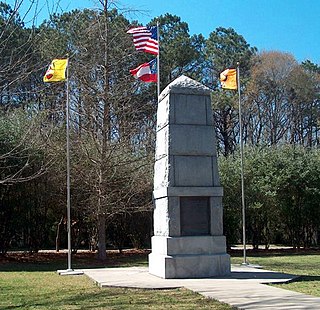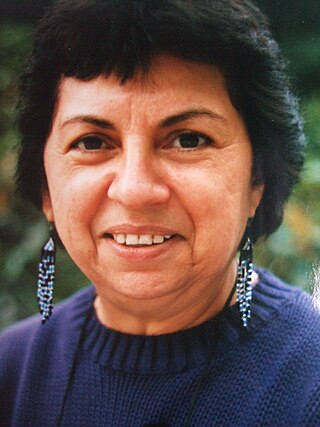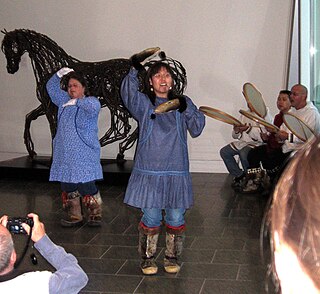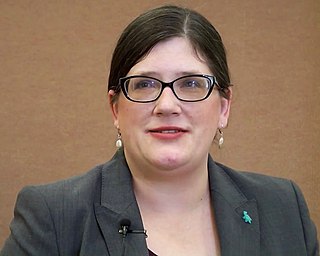
Native Americans, sometimes called American Indians, First Americans, or Indigenous Americans, are the Indigenous peoples of the United States or portions thereof, such as American Indians from the contiguous United States and Alaska Natives. The United States Census Bureau defines Native American as "all people indigenous to the United States and its territories, including Native Hawaiian and Other Pacific Islanders, whose data are published separately from American Indians and Alaska Natives". The U.S. census tracks data from American Indians and Alaska Native separately from Native Hawaiian and other Pacific Islanders, who include Samoan Americans and Chamorros.

The Trail of Tears was the forced displacement of approximately 60,000 people of the "Five Civilized Tribes" between 1830 and 1850, and the additional thousands of Native Americans within that were ethnically cleansed by the United States government.

Gloria Evangelina Anzaldúa was an American scholar of Chicana feminism, cultural theory, and queer theory. She loosely based her best-known book, Borderlands/La Frontera: The New Mestiza (1987), on her life growing up on the Mexico–Texas border and incorporated her lifelong experiences of social and cultural marginalization into her work. She also developed theories about the marginal, in-between, and mixed cultures that develop along borders, including on the concepts of Nepantla, Coyoxaulqui imperative, new tribalism, and spiritual activism. Her other notable publications include This Bridge Called My Back: Writings by Radical Women of Color (1981), co-edited with Cherríe Moraga.

Paula Gunn Allen was an American poet, literary critic, activist, professor, and novelist. Of mixed-race European-American, Arab-American, and Native American descent, she identified with her mother's people, the Laguna Pueblo. Gunn Allen wrote numerous essays, stories and poetry with Native American and feminist themes, and two biographies of Native American women. She edited four collections of Native American traditional stories and contemporary writing.
Racial passing occurs when a person who is classified as a member of a racial group is accepted or perceived ("passes") as a member of another racial group. Historically, the term has been used primarily in the United States to describe a black or brown person or of multiracial ancestry who assimilated into the white majority to escape the legal and social conventions of racial segregation and discrimination. In the Antebellum South, passing as white was a temporary disguise used as a means of escaping slavery. Other instances include cases of Jews in Nazi Germany attempting to pass as "Aryan" and non-Jewish to escape persecution.
Craig Womack is an author and professor of Native American literature. He self-identifies as being of Creek and Cherokee descent, but is not enrolled with any Native American tribe. Womack wrote the book Red on Red: Native American Literary Separatism, a book of literary criticism which argues that the dominant approach to academic study of Native American literature is incorrect. Instead of using poststructural and postcolonial approaches that do not have their basis in Native culture or experience, Womack claims the work of the Native critic should be to develop tribal models of criticism. In 2002, Craig won Wordcraft Circle Writer of the Year Winner. Along with Robert Allen Warrior, Jace Weaver and Greg Sarris, Womack asserted themselves as a nationalist, which is part of an activist movement. The movement significantly altered the critical methodologies used to approach Native American literature.
INCITE! Women, Gender Non-Conforming, and Trans people of Color Against Violence, formerly known as INCITE! Women of Color Against Violence, is a United States-based national activist organization of radical feminists of color advancing a movement to end violence against women of color and their communities. INCITE! is organized by a national collective of women of color and has active chapters and affiliates in San Francisco, Washington, D.C., Denver, Albuquerque, Austin, New Orleans, Boston, Philadelphia, New York City, Ann Arbor, Binghamton, Chicago, and a chapter in Toronto, Ontario, Canada. INCITE! was founded in 2000.
The Cherokee Freedmen controversy was a political and tribal dispute between the Cherokee Nation of Oklahoma and descendants of the Cherokee Freedmen regarding the issue of tribal membership. The controversy had resulted in several legal proceedings between the two parties from the late 20th century to August 2017.
David Cornsilk is a professional genealogist and served as the managing editor of the Cherokee Observer, an online news website founded in 1992. He founded of the grassroots Cherokee National Party in the 1990s, seeking to create a movement to promote the Nation as a political entity. While working as a full-time store clerk at Petsmart, he "took on America’s second-largest Indian tribe, the Cherokee Nation, in what led to a landmark tribal decision. Cornsilk served as a lay advocate, which permits non-lawyers to try cases before the Cherokee Nation’s highest court." Cornsilk had worked for the nation as a tribal enrollment research analyst and for the Bureau of Indian Affairs as a genealogical researcher. He also has his own genealogical firm. He ran in the 2023 Cherokee Nation principal chief election. He lost the election to incumbent principal chief Chuck Hoskin Jr.

Native American identity in the United States is a community identity, determined by the tribal nation the individual or group belongs to. While it is common for non-Natives to consider it a racial or ethnic identity, for Native Americans in the United States it is considered to be a political identity, based on citizenship and immediate family relationships. As culture can vary widely between the 574 extant federally recognized tribes in the United States, the idea of a single unified "Native American" racial identity is a European construct that does not have an equivalent in tribal thought.

Jimmie Bob Durham was an American sculptor, essayist and poet. He was active in the United States in the civil rights movements of African Americans and Native Americans in the 1960s and 1970s, serving on the central council of the American Indian Movement (AIM). He returned to working at art while living in New York City. His work has been extensively exhibited. Durham also received the Günther-Peill-Preis (2003), the Foundation for Contemporary Arts Robert Rauschenberg Award (2017), and the 58th Venice Biennale's Golden Lion for lifetime achievement (2019).

Sarah Deer is a Native American lawyer, and a professor of Women, Gender, and Sexuality studies and Public Affairs and Administration at the University of Kansas. She was a 2014 MacArthur fellow and has been inducted into the National Women's Hall of Fame in 2019.
The Indian princess is usually a stereotypical and inaccurate representation of a Native American or other Indigenous woman of the Americas. The term "princess" was often mistakenly applied to the daughters of tribal chiefs or other community leaders by early American colonists who mistakenly believed that Indigenous people shared the European system of royalty. This inaccurate portrayal has continued in popular animation, with characters that conform to European standards of beauty, with the most famous misrepresentation being that of Pocahontas. Frequently, the "Indian Princess" stereotype is paired with the "Pocahontas theme" in which the princess "offers herself to a captive Christian knight, a prisoner of her father, and after rescuing him, she is converted to Christianity and lives with him in his native land." - a false narrative which misrepresents the events of Matoaka's life. The phrase "Indian princess", when used in this way, is often considered to be a derogatory term, a type of racial slur, and is deemed offensive by Native Americans.

Nkechi Amare Diallo is an American former college instructor and activist known for presenting herself as a black woman despite being born to white parents. She is also a former National Association for the Advancement of Colored People (NAACP) chapter president.
Circe Sturm is a professor in the Department of Anthropology, University of Texas, Austin. She is also an actress, appearing mainly in films and commercials.
Mary Kathryn Nagle is a playwright and an attorney specializing in tribal sovereignty of Native nations and peoples. She was born in Oklahoma City, OK, and is an enrolled citizen of the Cherokee Nation of Oklahoma. She previously served as the executive director of the Yale Indigenous Performing Arts Program (YIPAP) from 2015 to 2019.
Joanne Barker became a faculty member within the American Indian Studies Department at San Francisco State University, in 2003. Much of her work focuses on indigenous feminism and the sovereignty and self determination of indigenous peoples. Her work takes a transnational approach, making connections between and across the borders of countries. Barker makes historical and scholarly connections between the oppression and resistance of marginalized communities. An example of this transnational approach can be seen by the work that Barker has done to show connections in the struggles of Palestinians in Israel and indigenous communities in the United States.
Cherokee descent, "being of Cherokee descent", or "being a Cherokee descendant" are all terms for individuals with some degree of documented Cherokee ancestry but do not meet the criteria for tribal citizenship. The terms are also used by non-Native individuals who self-identify as Cherokee despite lacking documentation or community recognition.
Racial or ethnic misrepresentation occurs when someone deliberately misrepresents their racial or ethnic background. It may occur for a variety of reasons, such as someone attempting to benefit from affirmative action programs for which they are not eligible.
Pretendian is a pejorative colloquialism used to call out a person who has falsely claimed Indigenous identity by professing to be a citizen of a Native American or Indigenous Canadian tribal nation, or to be descended from Native American or Indigenous Canadian ancestors. As a practice, being a pretendian is considered an extreme form of cultural appropriation, especially if that individual then asserts that they can represent, and speak for, communities from which they do not originate. It is sometimes also referred to as a form of fraud, ethnic fraud or race shifting.








